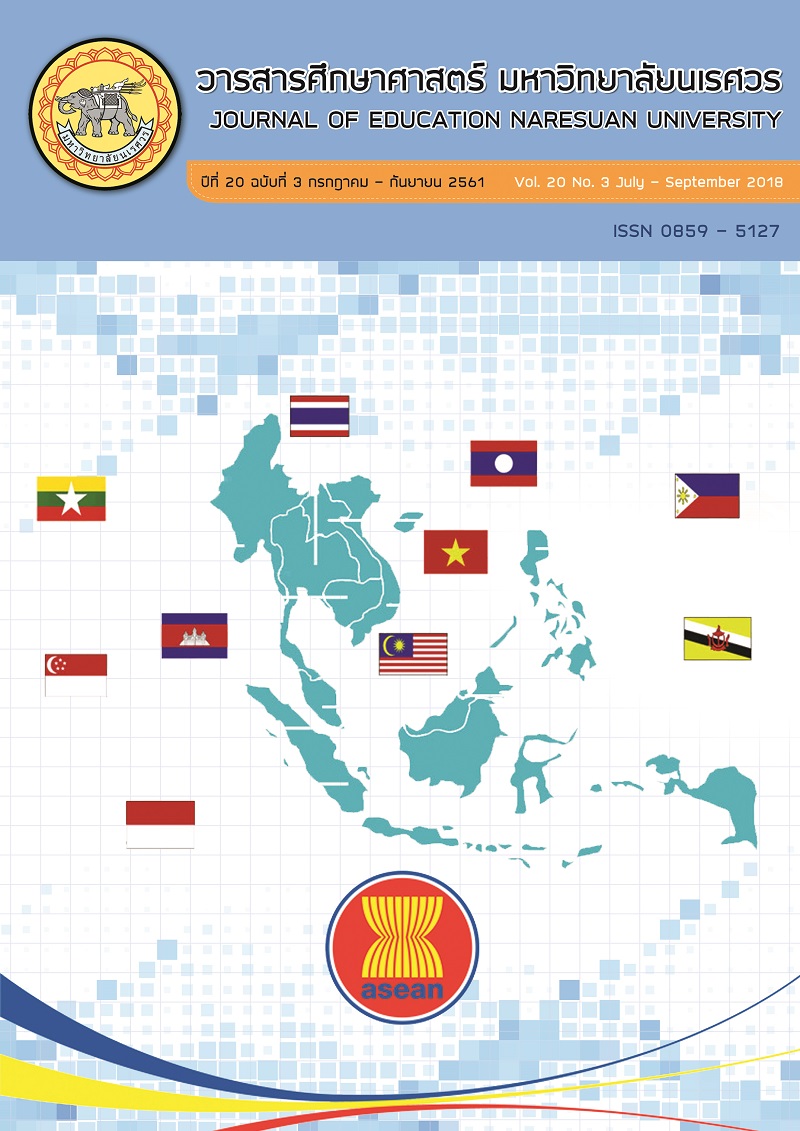การพัฒนาจริยธรรมทางเพศวิถีของนักศึกษาโดยการปรึกษากลุ่มเชิงบูรณาการ; A DEVELOPMENT OF STUDENTS MORAL SEXUALITY THROUGH ASSIMILATIVE INTEGRATION GROUP COUNSELING
Main Article Content
Abstract
การวิจัยครั้งนี้มีวัตถุประสงค์เพื่อ ศึกษาจริยธรรมทางเพศวิถีของนักศึกษาและพัฒนาจริยธรรมทางเพศวิถีของนักศึกษาโดยการปรึกษากลุ่มเชิงบูรณาการ กลุ่มตัวอย่างแบ่งออกเป็น 2 กลุ่ม กลุ่มตัวอย่างที่ 1 คือ นักศึกษาที่กำลังศึกษาอยู่ในระดับชั้นปีที่ 1 คณะครุศาสตร์หรือคณะศึกษาศาสตร์มหาวิทยาลัยในเขตภูมิภาคตะวันออกเฉียงเหนือ จำนวน 400 คน ที่ได้มาจากการสุ่มแบบหลายขั้นตอน แบ่งเป็นเพศชาย 200 คน และเพศหญิง 200 คน กลุ่มตัวอย่างที่ 2 คือ นักศึกษาที่กำลังศึกษาอยู่ในระดับชั้นปีที่ 1 คณะครุศาสตร์หรือคณะศึกษาศาสตร์ จำนวน 20 คนที่ได้มาจากการสุ่มแบบเฉพาะ เจาะจง แบ่งออกเป็นกลุ่มทดลองและกลุ่มควบคุมกลุ่มละ 10 คน ในแต่ละกลุ่ม ประกอบด้วย เพศชาย 5 คน และเพศหญิง 5 คน เครื่องมือที่ใช้ในการวิจัย คือ แบบวัดจริยธรรมทางเพศวิถี และโปรแกรมการปรึกษากลุ่มเชิงบูรณาการ ผู้วิจัยดำเนินการทดลองให้การปรึกษากลุ่มจำนวน 14 ครั้ง ครั้งละ 90 นาที โดยใช้แบบแผนการวิจัยเชิงทดลองแบบสองทางสามองค์ประกอบ แบ่งการทดลองออกเป็น 3 ระยะ คือ ระยะก่อนการทดลอง ระยะหลังการทดลอง และระยะติดตามผล วิเคราะห์ความแปรปรวนแบบวัดซ้ำประเภทสองตัวแปรระหว่างกลุ่มและหนึ่งตัวแปรภายในกลุ่ม และทำการทดสอบ ความแตกต่างรายคู่ด้วยวิธีบอนเฟอร์โรนี ผลการวิจัย พบว่า 1) จริยธรรมทางเพศวิถีของนักศึกษาอยู่ในขั้นที่ 3 ใช้หลักการทำตามที่ผู้อื่นเห็นชอบ โดยนักศึกษาเพศชายมีจริยธรรมทางเพศวิถีต่ำกว่าเพศหญิงโดยรวมและในทุกด้าน และ 2) ไม่มีปฏิสัมพันธ์ระหว่างวิธีการทดลองกับระยะเวลาการทดลองและเพศ แต่มีปฏิสัมพันธ์ระหว่างวิธีการทดลองกับระยะเวลาการทดลองอย่างมีนัยสำคัญทางสถิติที่ระดับ .05 กลุ่มทดลองมีจริยธรรมทางเพศวิถีในระยะหลังการทดลองและระยะติดตามผลสูงกว่าในระยะก่อนการทดลองอย่างมีนัยสำคัญทางสถิติที่ระดับ .05 กลุ่มทดลองมีจริยธรรมทางเพศวิถีในระยะหลังการทดลองและระยะติดตามผลสูงกว่ากลุ่มควบคุมอย่างมีนัยสำคัญทางสถิติที่ระดับ .05 กลุ่มทดลองเพศชายและเพศหญิงมีจริยธรรมทางเพศวิถีในระยะหลังการทดลองและระยะติดตามผลสูงกว่ากลุ่มควบคุม อย่างมีนัยสำคัญทางสถิติที่ระดับ .05 และกลุ่มทดลองเพศชายและเพศหญิงมีจริยธรรมทางเพศวิถีไม่แตกต่างกัน
A DEVELOPMENT OF STUDENTS MORAL SEXUALITY THROUGH ASSIMILATIVE INTEGRATION GROUP COUNSELING
This research aimed to study the students of moral sexuality and to development of students moral sexuality through assimilative integration group counseling. The sample were divided into 2 groups. The first group was 400 students who were studying in the 1st year in the Faculty of Education at Universities in the Northeast Region were derived from a randomized, (Multistage Random Sampling). The second group was divided into male 200 and female 200 people. The second example was 20 students who were studying in the 1st year in the Faculty of Education which were chosen by the random placement (Purposive sampling). The sample was divided into an experimental group and a control group of 10 people each, group consisted of 5 male and 5 female. The instruments were the measurement moral of sexuality and the assimilative integration group counseling programs. The intervention was administered for 14 sessions. Each session lasted about ninety minutes. The research design was three-factor experiment with repeated measures. This study was divided into 3 phases: the pretest, the posttest and the follow-up phases. The data were analyzed by repeated measure analysis of variance: two between-subjects variables and one within-subjects variable: Bonferroni's multiple comparison was used to compare the differences. The findings showed that: 1) the moral sexuality of student were in stage 3, Good Boy-Nice Girl Orientation. Furthermore, Male students had moral sexuality lower than female students in all aspects, and 2) there were no interactions between the methods, the duration of the experiment and the genders. However, there were statistically interaction between the methods and the duration of the experiment (p < .05). The experimental group had moral sexuality in the posttest and follow-up phases higher than the pretest phase at the significance level of .05. The experimental group had moral sexuality in the posttest and follow-up phase higher than the control group at the significance level of .05. Male and female in the experimental group had moral sexuality in the posttest and follow-up phases higher than the control group at the significance level of .05. In addition, the differences between moral sexuality of male and female in the experimental group were not found.
Article Details
The owner of the article does not copy or violate any of its copyright. If any copyright infringement occurs or prosecution, in any case, the Editorial Board is not involved in all the rights to the owner of the article to be performed.
References
Beatrice O. Ahidahun. (2013). Sex counselling and its impacts on Adulescents' Moral Behavior. American International Journal of Social Science, 2(4), 34-39.
Howell, D. C. (2007). Statistical methods for psychology (6th ed.). Belmont, CA: Thomson Brooks/Cole Publishing.
Keith S. Dobson. (2010). Cognitive-behavioral therapies (3rd ed.). New York: The Guilford Press.
Kirby, D., Laris, B. A., & Rolleri, L. (2006). The impact of sex and HIV education programs in school and communities on sexual behavior among young adults. USA: Family Health International.
Kohlberg, L. (1976). Moral stages and moralization: The cognitive development approach, in moral development and behavior. New York: Holt Rinehart and Winston.
Krungkraipetch, K. (2011). The sexual outlets and sexual transmitted disease prevention behaviors among 3rd year undergraduate students of groups of health science program faculty, one of universities, eastern part, Thailand. Chonburi: Burapha University. (in Thai)
Laphimon, M. (2008). Language, sex in Thailand: The Rights and sexual wellbeing. Bangkok: Charoendee Munkhong Printing. (in Thai)
Patterson, C. H. (1980). Theories of counseling and psychotherapy (3rd ed.). New York: Harper and Row.
Pengchai, J. (2010). Knowledge about the counseling group. Maha Sarakham: Faculty of Education Mahasarakham University. (in Thai)
Panyayong, B. (2010). Review of knowledge on teen pregnancy. Nonthaburi: Ministry of Public Health. (in Thai)
Sawangbumrung, M., Jaiwongya R., & Sivabhaedya S. (2007). Perception of juveniles' sex ethics resulting from the cultural violence. Chiang Mai: Maejo University. (in Thai)
Saisamorn, R. (2004). The effects of rational emotive behavior therapy in group counseling for development on beliefs about premarital sex of lower secondary school students, Chonburi Sports School (Master thesis). Chonburi: Burapha University. (in Thai)
Sangpark, A. (2007). The effects of group counseling based on the rational emotive behavior theory on the sexual behaviors of adolescents (Master thesis). Khon Kaen: Khon Kaen University. (in Thai)
Thavichasri, W. (2003). A study of attitude and attitude change toward the opposite sex relations of MathayomSuksa II students of Sriyapai School in Changwat Chumporn. (Master thesis). Bangkok: Srinakharinwirot University. (in Thai)
Tongsamsi, I. (2010). The values of purity self-preserving, having boy/girl friends (Gig), and living together before getting married of students in the government institutes of higher education in Songkhla. Songkhla: Songkhla Rajabhat University. (in Thai)
Yamane, Taro. (1967). Statistics: An introductory analysis (2nd ed.). New York: Harper and Row.


